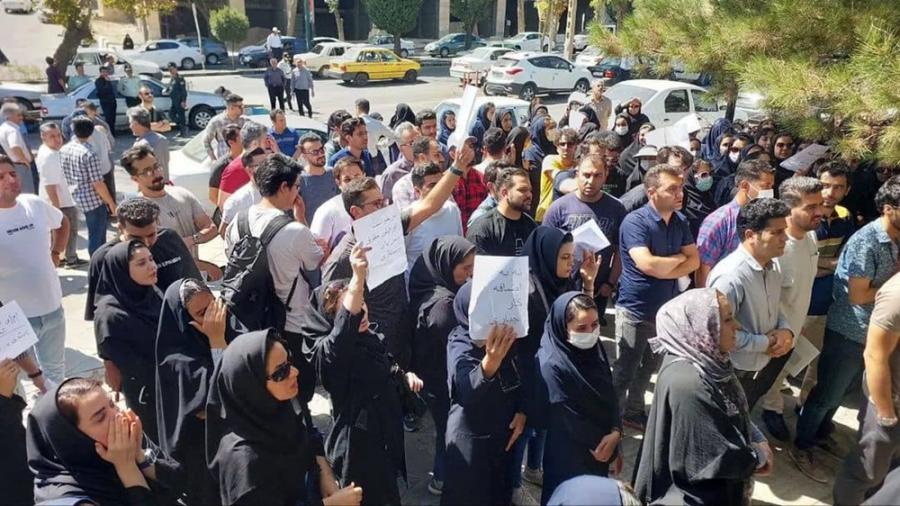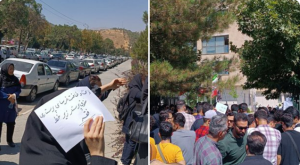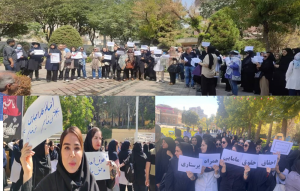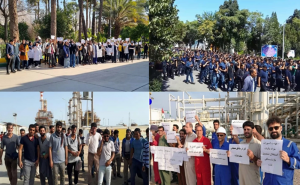
(Video) The Strain of Caring: Iran’s Nurses Take to the Streets in Unprecedented Protests
A nurse explained. “Imagine working seven hours overnight for just 140,000 Tomans ( $2,40) in overtime pay. It doesn't even cover the cost of transportation.”
PARIS, FRANCE, August 21, 2024 /EINPresswire.com/ -- The National Council of Resistance of Iran (NCRI) Foreign Affairs Committee in an article reported that in the sweltering summer of 2024, a wave of unprecedented protests by nurses and medical professionals swept across Iran, bringing to light the dire working conditions and mounting frustrations within the country’s healthcare system.
From Mashhad to Shiraz, Bushehr to Yasuj, these protests have become a powerful cry for help from those who have long been the unsung heroes in Iran’s battle against the COVID-19 pandemic and beyond.
The nurses, who once stood at the frontline of the global health crisis, are now fighting for their survival in a system that has seemingly turned a blind eye to their plight.
The ongoing protests, now entering their second week, reflect a deep and widespread discontent among Iran’s nursing community. In Mashhad alone, nurses from major hospitals such as Imam Reza, Akbar, and Hasheminejad have halted their work, demanding justice in the face of what they describe as unbearable working conditions.
“We are expected to care for others, but who will care for us?” reads one of the placards held by protesting nurses a stark reminder of the personal toll this profession has exacted on them.
At the heart of the protests are demands for the fair implementation of the Tariff Plan for Nursing Services, a law passed in 2006 that has yet to be justly enforced.
The discontent has been brewing for some time, but the tipping point came with the government’s failure to recognize and reward the extraordinary sacrifices made by nurses during the COVID-19 pandemic. Despite being hailed as heroes, many nurses were left with little more than fatigue, trauma, and a paycheck that barely covered their living expenses.
“We fought against COVID with no support, and now we have to fight for our rights,” one nurse in Shiraz lamented, underscoring the profound sense of betrayal many in the profession felt.
The roots of the current crisis can be traced back to longstanding structural issues within Iran’s healthcare system, which has consistently marginalized the nursing profession.
While the system has often been described as “doctor-centered,” even physicians are increasingly facing severe livelihood challenges with suicide and migration rates of Iranian physicians at an all-time high.
“We are part of a chain, but one link is always being overlooked,” said a nurse from Mashhad, highlighting the interconnected nature of healthcare where neglecting one part inevitably leads to systemic failures.
“We work night shifts for a pittance,” a nurse explained. “Imagine working seven hours overnight for just 140,000 tomans (approximately $2,40) in overtime pay. It doesn’t even cover the cost of transportation.”
The toll on the personal lives of these nurses is profound. Many have faced the impossible choice between staying in a profession they love and seeking better opportunities abroad. The exodus of healthcare professionals has reached alarming levels, with reports indicating that more nurses are emigrating than the Ministry of Health can hire.
“Those who can, leave,” Sharifi-Moghaddam, Secretary-General of Iran’s Nurses’ Home, says, “and those who stay, either switch to less demanding office jobs or simply quit, finding it less costly to stay home than to continue in a job that offers so little in return.”
The emotional and psychological strain has also led to tragic outcomes. In recent months, there have been reports of suicides among nurses in Tehran, Kermanshah, and other cities, underscoring the extreme pressure and hopelessness that many feel. “We are breaking under the weight of it all,” admitted a nurse, capturing the desperation that pervades the profession.
The protests have highlighted nurses' personal hardships and exposed a broader systemic failure. The refusal to implement the Tariff Plan for Nursing Services fairly is symbolic of the government’s disregard for the welfare of its medical professionals.
Instead of addressing the root causes of discontent, the government has responded with threats, intimidation, and even disciplinary actions against protesting nurses. “Rather than solving the problem, they try to silence us,” said a nurse from Tehran, reflecting the frustration that has fueled the ongoing strikes.
The consequences of this neglect are already evident. The shortage of nurses has become critical, with many hospitals operating with skeleton crews, leading to deteriorating patient care. “The system is collapsing,” warns Sharifi-Moghaddam. “If the government doesn’t act soon, there will be no one left to care for the sick.”
However, the main roots of the current crisis lie in the deep-seated structural issues within Iran’s healthcare system, which has long marginalized the nursing profession. While both doctors and nurses face severe livelihood challenges, nurses suffer the most from wage disparities and lack of recognition.
The corrupt ruling system prioritizes its survival through nuclear ambitions and regional warmongering, leaving little hope for an enduring solution. The true resolution of Iran’s healthcare crisis, as in every other aspect of this country, hinges on a fundamental change in the regime.
According to reports, it has been more than 10 days since the start of the nurses’ strikes in several cities, particularly in Shiraz, and the scope of these strikes is expanding daily.
In a statement regarding the recent protests by nurses, the Nurses’ Association of Khorasan Razavi province, declared that the ongoing protests by nurses in various cities are the result of “wrong policies, narrow-minded perspectives, discriminatory attitudes, and doctor-centered management.”
In this statement, the Nurses’ Association called for the full and unconditional implementation of the law on retirement for arduous and harmful jobs, allowing retirement after 20 years of service with 30 days of salary.
The statement mentioned that one of the nurses’ demands is the implementation and issuance of special extraordinary allowances for nursing staff “with a reasonable coefficient” and the precise determination of its financial resources by the Parliament and the Planning and Budget Organization.
The statement emphasized that this measure should be applied from the beginning of the current year and should be permanently included in the budget.
The Nurses’ Association also called for a change in the implementation method of the Nursing Tariff Law, stressing that this change should result in each nursing staff member receiving at least four times their current pay.
The statement also stressed that the hourly rate for nurses’ overtime should be at least 1.2 million rials considering the difficulty of their work and that nursing decisions and regulations should be made with the presence and input of the nurses themselves and their representatives, without interference from other sectors.
According to the regime’s ISNA news agency, Fatemeh Bahreini, the head of the Nursing System Organization of Mashhad, referring to the longstanding protests of nurses, stated: “The nurses’ tariff has been implemented in the worst possible way after 16 years, and despite repeated protests and gatherings, the tariff issues have not been resolved.”
She added: “The nurses’ bonuses have been cut and are being given in smaller amounts under the name of tariffs.”
Referring to today’s nurses’ gathering, Bahreini said: “Since the beginning of this year, nurses have held gatherings, but so far, there has been no follow-up on their demands.”
Bahreini also said that during the Raisi administration, the Vice President issued a directive to provide welfare credits, but the credits were not provided .“Unfortunately, this is such that in Mashhad, our housing allowance is 1 million rials per month. In various occasions, no money has been paid to our nursing colleagues in Mashhad,” she said.
One of the important problems of nurses is the taxing overtime work. Nurses receive 200,000 rials per hour for overtime, and a nurse with 28 years of service receives 430,000 rials per hour without tax deductions.
“Some departments have excess staff where overtime is not needed, but nurses are forced to stay for overtime,” Bahreini said.
Nurses are one of several communities that are holding protests across the country against the regime’s policies and corruption. On Sunday, in tandem with the demonstrations of nurses, retirees of the Social Security Organization and the steel sector held protest rallies in different cities. The protesters demand higher pensions and basic services according to the regime’s laws.
Literacy educators also held rallies in Qom, demanding the promotion of their contract to that of official teachers.
Employees of the oil and gas company in Aghajari also resumed their protest rallies as regime authorities ignored their just and legal demands for better job security and wages.
The farmers of Isfahan continue their protest rally in Khorasgan Square as the regime is denying them rightful access to irrigation water for their lands.
If you wish to receive the NCRI weekly Newsletter, please use the following link to subscribe: https://bit.ly/3SMgEla.
Shahin Gobadi
NCRI
+33 6 61 65 32 31
email us here
In recent months, there have been reports of suicides among nurses in Tehran, and other cities, showing the extreme pressure and hopelessness that many feel.
Distribution channels: Human Rights, International Organizations, Politics, U.S. Politics, World & Regional
Legal Disclaimer:
EIN Presswire provides this news content "as is" without warranty of any kind. We do not accept any responsibility or liability for the accuracy, content, images, videos, licenses, completeness, legality, or reliability of the information contained in this article. If you have any complaints or copyright issues related to this article, kindly contact the author above.
Submit your press release




